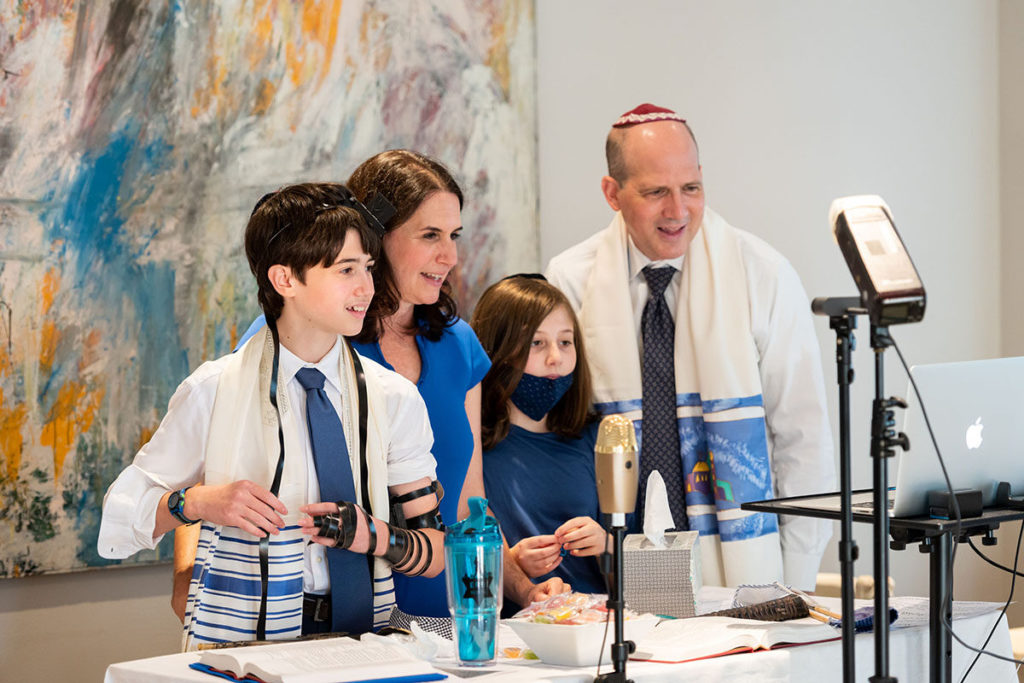
By Jennifer Zwilling and Jon Rosenwasser
In March, just as the pandemic was forcing a shutdown of most routine social and economic activity in the U.S., we had to cancel plans to attend a bar mitzvah in Boston. We put together an impromptu Zoom bat mitzvah party to celebrate our friends’ simcha.
At the time, Zoom was still something of a novelty. But then, six months later and with no end to coronavirus in sight, our own son’s August bar mitzvah was rapidly approaching. What would we do?
At first, we felt a sense of loss, knowing that a family gathering to celebrate the occasion was impossible. Rather than belabor what we could not have, however, we leaned into creating an online bar mitzvah. The result was a surprisingly intimate, joyous and memorable occasion, and, as one cousin remarked, “exactly what the 80-plus families gathered online needed.”
In a time when it feels particularly important to create opportunities for joy whenever possible, here is what we learned to make the occasion a success:
Adjust your attitude
Your child’s online bar mitzvah doesn’t need to be a poor substitute for the “real” thing. There are real benefits to a Zoom mitzvah, including that everyone has a front-row seat for the event, and there’s a permanent recording for posterity. Plus, no one has to travel and the cost is much less. And, for some kids who get nervous about being the center of attention or are overwhelmed in large crowds, an online event can be ideal.
Be generous with your guest list
For an in-person bar mitzvah there is often a limit to the number of invited guests. Online is virtually unlimited, however, and while we extended a few last-minute invitations to old friends or distant relatives, we regret that we didn’t think expansively enough about our guest list. A bar or bat mitzvah is a rare opportunity to gather together in a socially distanced world, and people are craving that connection right now. If you’re concerned about the perception that an invitation is a request for presents, make clear in the invite that no gifts are allowed, or specify a charity for guests to donate to, if they so wish.
Let people know that this is it
While you can hold out aspirations for doing a synagogue service IRL or hosting a blowout party at a later date, you should let everyone know to treat the Zoom mitzvah as the main event. It’s your job to help your guests do this. We sent a beautiful, digital invitation, and shared instructions with our guests for how to get online. We also sent a program and links to a digital siddur in advance to let them know what to expect. Friends who hosted their son’s bar mitzvah a few weeks prior to ours sent kits to relatives and friends with kippot and candy to throw at the screen.
Strive for a festive and comfortable vibe
One way to set the tone is to encourage people to dress for the occasion. For us, that meant different things for different folks — friends just waking up in different time zones could join in PJs, coffee in hand, while other family and friends used the bar mitzvah as an excuse to dress up! At home, we donned festive clothes but made comfort a priority. The bar mitzvah boy wore a tie and shorts; mom wore a dress but went barefoot.
Invest in the appropriate technology
One of the most critical facets of a successful online event is being able to see and hear what’s happening. Yes, you could just use your laptop’s camera and microphone, but the quality will likely be insufficient for the intimacy you want to create. With a few modest investments you can emulate a television production set: multiple high-definition camera angles, a professional-grade microphone, photographer-quality lights and a hard-wire LAN connection.
Find a Zoom operator
Hire a technical producer for your event. Our producer told us what equipment to procure and he helped us create the “set” in our living room. He did it all remotely, which gave us the advantage of maintaining social distance, and it also allowed him to see and hear how we would look to others (and therefore make adjustments accordingly). We did three dry runs, including one with the clergy.
A producer is more than an IT guy — they are also your conduit to your family and guests. At our son’s bar mitzvah, our “Zoom operator” ran the show so we could focus on being present. He welcomed guests, got them using the chat to send us notes, took care of the occasional hot mike and helped older relatives who needed help turning on their video or finding the mute button. Throughout the event, he also managed our guests’ view, choosing which camera to spotlight, and ensuring that guests who offered readings had their sound on and ready.
Make it your own
Originally, our son’s bar mitzvah would have been part of our synagogue’s Shabbat services. Our Zoom bar mitzvah was essentially a private affair — it was conducted by our synagogue clergy but outside of the services they livestream for the community. We worked closely with both our clergy and our producer to create the prayer experience and sense of community we were craving. Our clergy helped us consider several different options for the prayer service and Torah reading, and the producer helped us facilitate some of the fun and interactive moments.
It may have been a “virtual” bar mitzvah, but it was as real as it gets.
Jennifer Zwilling is the chief strategy and campus success officer at Hillel International. Jon Rosenwasser is the minority budget director for the U.S. Senate Select Committee on Intelligence. They live in Washington, D.C. with their two children. This was published by Kveller, a 70 Faces Media brand.







